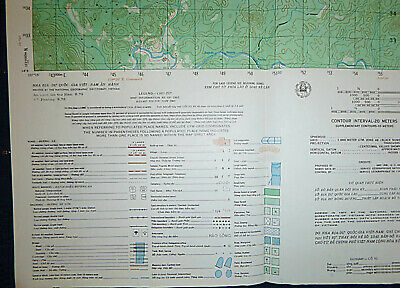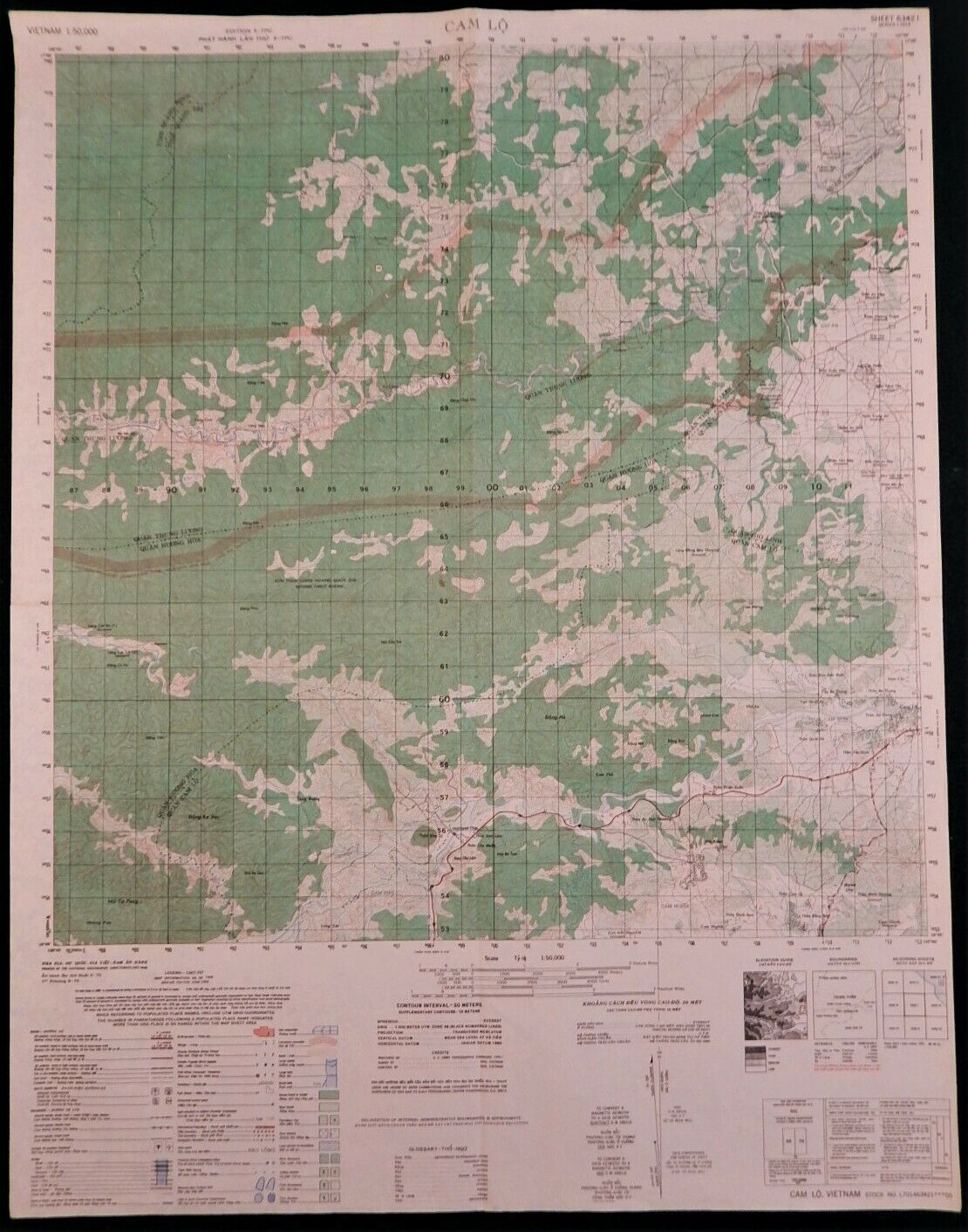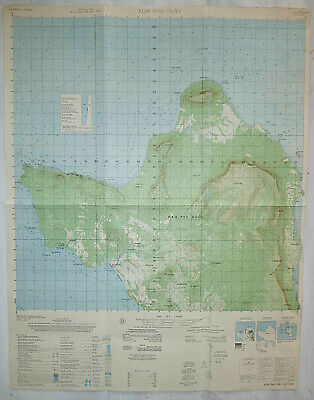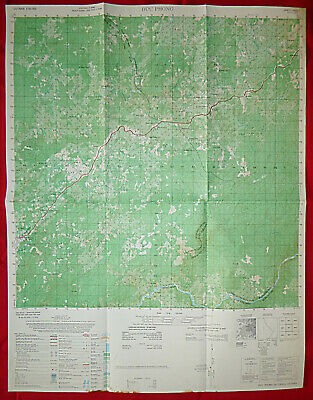-40%
6438 i - MAP - LAOS JUNGLE OPS - White Star - DAK PLAOUAT - 1973 - Vietnam War
$ 5.27
- Description
- Size Guide
Description
For you Kind Consideration.Rare Map - US MILITARY - Vietnam War - Laos Jungle Ops - September 1973
Operation White - 7th US Special Forces Group Airborne
Dak Palouat - Khoueng Attopeau - Trung Phan - Muang Lave - Muang Sekong - Kontum - Ho Chi Minh Trail - Dak Xou - Tong Nat - US 7th Special Forces Airborne - CIA
US MILITARY MAP - Vietnam War Map
Measures - 29 x 22.5 inches (74 x 59 cms)
Series L7014
Scale 1:50,000
Printed - September 1973
Map Number - 6438 i
Whilst the US combat involvement in Vietnam had (officially) ended by the time this map was printed the war in Laos very much continued and did not end until the fall of Long Tieng in May 1975 (After the fall of Saigon). A terrifically rare piece.
LAOTIAN HIGHWAY PATROL - Operation White Star – Laos – 7
th
Special Forces - Recon
US SPECIAL FORCES - MACV SOG
Initially instigated by the SOE in 1959 ‘Operation White Star’ was set-up to train members of the Meo Tribe to resist the growing threat of the Pathet Lao, the Communist's in Laos.
Operation White Star was discontinued in 1962 after the Geneva Accords. It was revived with a defined role and renewed vigour in 1965.
Led by US Special Forces, Major Larry Thorne, Op 35 (Operation White Star and later named Operation Shining Brass) was set-up to fight the Pathet Lao and the North Vietnamese inside Laos. It consisted of three stages;
US Special Forces Recon into Laos (from South Vietnam, North Vietnam, Thailand and Cambodia) to identify trails used and base camps of enemy.
US Special Forces led, Exploitation Commando units including Montagnard Special Forces annihilation of VC / Pathet Lao Base Camps.
US Special Forces Operatives remaining in Laos after Operations to set-up Resistance Cells amongst the locals, these units called the 'White Star Resistance'.
They operated from the US Special Forces camp at Kham Duc on the Laos Border.
Note: It should be noted that Major Larry Thorne was a native Finn and a winner of the highest Military Award of Finland, The Mannerheim Cross, on two occasions for his defence against Soviet Attacks in WWII including an ambush on a Russian Convoy that led to the deaths of over 300 Soviets without him losing one Man.
During WWII he commanded Finnish Commandos behind Soviet Lines to harass their advance - At the end of WWII he joined the US Army, under the Lodge Bill, as a Private, volunteered for Special Forces and within months was commissioned a Captain.
The first operation of the renewed Op 35 (White Star) took place in October 1965 - During this operation, before a shot had been fired inside Laos by the newly formed group, the helicopter carrying Larry Thorne, all passengers and crew were lost.
Operation White Star, Officially Operation 35, later to be known as Operation Shining Brass was to continue in varying forms and with varying names through to the end of the war.
Long Tieng – Laos – The Most Secret Place on Earth.
Long Tieng (also spelled Long Chieng, Long Cheng, or Long Chen) is now an off limits, Laotian military base located in Xiang Khouang Province.
During the Vietnam War, it served as a town and airbase operated by the Central Intelligence Agency of the United States.
During this time, it was also referred to as Lima Site 98 (LS 98) or Lima Site 20A (LS 20A).
At the height of its significance in the late 1960s, the "secret city" of Long Tieng maintained a population of 40,000 inhabitants, making it the second largest city in Laos at the time, although it appeared on few maps throughout this period.
In 1962 the CIA first set up a headquarters for Major General Vang Pao in the Long Tieng valley, which at that time had almost no inhabitants.
By 1964 a 1260m-long runway had been completed and by 1966 Long Tieng was one of the largest US installations on foreign soil, becoming one of the busiest airports in the world.
North Vietnamese forces began to threaten Long Tieng in late 1971, and came close enough to start shelling the area on December 31st at 15:30 local time.
In early January, 19,000 North Vietnamese forces launched a four pronged attack on Long Tieng from all four directions, encircling the site, capturing several facilities and positions, and installing antiaircraft batteries.
Despite subsequent claims of victory from communist forces, the 10,000 defenders of Long Tieng, a mixture of Hmong, Thai, and Lao, had not been overrun, and in mid-month reinforcements appeared in the form of CIA-led Thais and 1200 elite irregulars from southern Laos.
After enduring a third to 50% casualties, these forces succeeded in taking back key positions by the end of the month.
Long Tieng was often described as “The Most Secret Place on Earth”.
It was located in a valley at 3,100 feet elevation, high enough to have chilly nights and cold fogs. It was surrounded by mountains and on the northwest side of the runway were karst outcrops several hundred feet high.
In the shadow of the Karst outcrops was “Sky” the CIA headquarters in Long Tieng. Jerry Daniels, a CIA officer codenamed “Hog,” is said to have named Sky after his home state of Montana, known as “Big Sky Country.”
Long Tieng was protected on three sides by limestone mountains.
“What a place is Long Tieng, Tribal soldiers dressed in military garb standing next to traditionally dressed Hmong, with Thai mercenaries milling about. And the Americans here are mostly CIA operatives with goofy code names like Hog, Mr. Clean, and Junkyard. The town itself is not much. There’s one paved road running through it and tin shacks on either side with eating shops, food stalls, and living quarters.”
USAID officer Jim Schill.
On February 22, 1975, the final defensive outpost for Long Tieng was defeated, leading US Brigadier General Heinie Aderholt to begin planning an evacuation.
By May 1975, there were almost 50,000 guerrillas and refugees living in and around the city.
However, by then, the U.S. had withdrawn all its civilian and military personnel from Indochina, except for a few Embassy personnel in Laos and CIA officer Jerry Daniels in Long Tieng.
There were few resources for an evacuation. Daniels had only a single transport aircraft and Hmong pilot in Long Tieng to take evacuees to Udon Thani, Thailand.
Aderholt located three additional American transport aircraft and pilots in Thailand. He had the planes “sheep dipped” to remove all markings identifying them as American-owned and sent them to Long Tieng.
On May 10, 1975, Vang Pao reluctantly followed the CIA's counsel and decided that he could no longer maintain Long Tieng against the opposing forces.
Between May 10 to May 14, 1975, US C-130s and C-46s airlifted people from the airbase to US bases in Thailand.
Between 1,000 and 3,000 Hmong were evacuated.
Crowds of civilians surrounded the flights on the runways, creating a chaotic atmosphere. Those evacuated were primarily Hmong military leaders and CIA employees.
The evacuation ended with the departure of Major General Vang Pao and Jerry Daniels.
Vang Pao told the people still on the tarmac "Farewell, my brothers, I can do nothing more for you, I would only be a torment for you," as he boarded a helicopter.
Tens of thousands of fighters and refugees were left behind.
The 10,000 or more Hmong clustered around the airfield expected more aircraft to return, but they soon realized that none would come. The shelling of Long Tieng began on the afternoon of May 14.
Many of the Hmong fighters and their families made their way overland to Thailand during the next several years, a dangerous journey that cost many of them their lives
During the Vietnam War, Long Tieng became the largest Hmong settlement in the world.
General Vang Pao moved to the United States in 1975.
Command Control, North, South, Central, MACV, Special Forces, SOG, Special Op’s, Special Operations Group, 5 th Special Forces, Army Security Agency, Military Intelligence, Psy-Ops, US Army, De Oppresso Liber, Airborne, 1 st Special Forces, CIDG, Mike Force, Mobile Guerrilla Force, Mobile Strike Force, Operations Detachment, Provincial Recon Unit, Recon Teams, RT, USMC, United States Marine Corps, Vietnam War, WWII, WWI, French Indochine War, French Foreign Legion, Legion Etrange, Project Omega, Recondo School, Rapid Fire, Project Delta, Special Missions Advisory Force, Project Gamma, Project Sigma, Indigenous Troops, MACV-SOG, CCC, CCS, CCN, USARV, SMAG, TAG, Field Training Command, Recon Team Leader, US Navy, Air Force, AATTV, Long Tan, Nui Dat, AAFV, ATF, New Zealand V Force, Big Red One, 1st Infantry Division, 1st Cavalry Division, Tropic Lightning, 25th Infantry Division, Subdued, Patch, Patches, Uniform, Helmet, Flash, Beret, Arc, Tab, 101 st Airborne Division, 82nd Airborne, 173rd Airborne, Combat, Militaria, Medal, Badge, Map, 199th Infantry Brigade, Old Ironsides, 5th Infantry Division, MAAG, USARPAC, XXIV Corps, 23rd Infantry Division, Americal, 38th Infantry Division, Black Op’s, Clandestine, Non-Conventional Warfare, 11th Infantry Brigade, 11th Armored, 196th , 1st Aviation, 18th Engineers, Medic, Medical, Viet Cong, VC, Viet Minh, Dien Bien Phu, Saigon, Tiger Force Rangers, Ranger, Logistical Command, Khe Sanh, POW, RVN, ARVN, South Vietnam, North Vietnam, NVA, Hanoi, Siagon, Phan Rang, LLDB, Bright Light, Free World Forces, Company, Platoon, Patrol, Long Range, Special Forces, ARVN, Green Berets, Elite, Recon, Reconnaissance, CCN, CCC, CCS, MACV SOG, SOA, Paratrooper, Parachutist, Vietnam War, Special Operations, Military, Tiger, Ranger, Route, Team, VC, NVA, Viet Cong, Command Control, Republic of Vietnam, Assault Helicopter Company, Gunship, Spooky, US Air Forces, USAF, Ranger, Recondo, Lai Khe, Cu Chi, Long Tieng,















